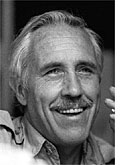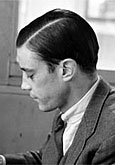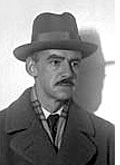
The obituaries for Jason Robards that appear in the Dec. 27 New York Times and Washington Post are perfect Rorschachs for the two newspapers. Although both papers put Robards' death on Page One, neither obit is really about Robards. Instead, each focuses on an historical figure with whom each newspaper is obsessed. In the Times' case, it's the playwright Eugene O'Neill. In the Post's case, it's the Post's former executive editor, Ben Bradlee. Adding to the confusion, the three men all look somewhat alike.
The Times obit by veteran theater critic Mel Gussow identifies Robards as the actor "who reclaimed the legacy of Eugene O'Neill. ... O'Neill would not have the reputation he has or his place in theatrical history were it not for Mr. Robards." The Post obit by veteran obit writer Martin Weil identifies Robards as someone who revived a sagging career by portraying Bradlee in the 1976 film adaptation of Bob Woodward and Carl Bernstein's how-we-got-that-Watergate-story book, All the President's Men. (The film won Robards the first of two consecutive Oscars.) According to Weil, Robards' Bradlee performance was "a kind of landmark and turning point."
The Times is more persuasive than the Post. Robards' impersonation of Bradlee, though dead-on, was a minor accomplishment. It wasn't even his most memorable film role, which is saying a lot because Robards really made his mark as a stage actor. It's natural, though, for the Post to think of All the President's Men as Robards' signal accomplishment because it glamorized what remains the Post's proudest achievement.

But if the Post can be faulted for overplaying Ben Bradlee's role in American cultural history, the Times can be faulted for overplaying Eugene O'Neill's role in American cultural history. While it's true that Robards' forceful portrayals of O'Neill characters did much to revive interest in O'Neill, so, too, did the Times' relentless coverage of everything having to do with O'Neill after Times man Arthur Gelb and his wife Barbara published their 1962 biography of the playwright (which they are currently expanding to three volumes; the first volume, Life With Monte Cristo, was hawked as an "editor's choice" in the New York Times Book Review, which also put the book's first chapter on its Web site). Arthur Gelb, now retired, was a powerful figure at the Times, an intimate of Abe Rosenthal who worked at the paper 55 years and rose to managing editor. For about two decades starting in 1967, when he was metropolitan editor, Gelb controlled the Times' daily cultural coverage. This displayed what Charles Kaiser, writing in Newsweek in 1982, termed an "idiosyncratic preoccupation" with O'Neill. Kaiser cited a "lengthy profile of the Wallingford, Conn., hospital where O'Neill was treated for tuberculosis 70 years ago." Two years later, he might have cited Gelb's own quote in the Times obituary of its longtime drama critic, Brooks Atkinson, which began as follows:
Brooks Atkinson began reviewing shortly after Eugene O'Neill appeared as a theater force in 1920, startling Broadway audiences with the first native American tragedy. Before O'Neill, most American plays were frothy entertainment. Atkinson was among O'Neill's earliest admirers, appreciative of his attempt to bring the American theater up to the standard of the ancient Greek theater of cathartic tragedy.
(In fairness, it should be stated that the next two paragraphs of Gelb's quote focused on the deceased.)
In his declining years, Tennessee Williams actually cited Gelb's O'Neill biography as evidence that the Times had it in for him. That was sheer paranoia, of course, but it's probably just as well that Williams didn't live to hear about the party the Times threw for Gelb when he stepped down as managing editor to run the New York Times Co. Foundation in 1989. Gelb's Times colleagues ribbed Gelb at the affair by presenting him with a mock front page of the Times. One story reported that
playwright Eugene O'Neill returned today from the grave to gratefully thank Arthur for everything. Speaking with disarming candor, O'Neill said Arthur made him what he was today--a highly publicized writer who was, nonetheless, modestly talented and largely unread. "I was the Neil Simon of the 1920s," said O'Neill. "Arthur turned me into Shakespeare."

Is Chatterbox suggesting that America's only Nobel-Prize-winning playwright really was "modestly talented" and "the Neil Simon of the 1920s"? He is not. O'Neill wrote some memorable plays, including The Iceman Cometh, Long Day's Journey Into Night, Hughie, and A Moon For The Misbegotten, all of which Robards appeared in at one time or another. (The preceding links are to free and complete audios of Robards' performances in each. You can also view a clip of Robards in The Iceman Cometh by clicking here.) But having seen Robards on stage in three of these O'Neill plays (directed by Jose Quintero, the third member of the O'Neill-reviving triumvirate), Chatterbox must confess he spent most of the time in each instance waiting for Robards to open his mouth and bring O'Neill's often painfully creaky dialogue to life. O'Neill is clearly one of the great American playwrights, but how lasting will the contribution of the great American playwrights be as compared with that of, say, the great American novelists? Chatterbox has a hard time putting Long Day's Journey Into Night in a league with The Great Gatsby or Huckleberry Finn. Between O'Neill and Robards, the greater genius was very possibly Robards, and it's far from clear that O'Neill's exalted, Times-fed reputation will long outlast the death of the playwright's pre-eminent interpreter.